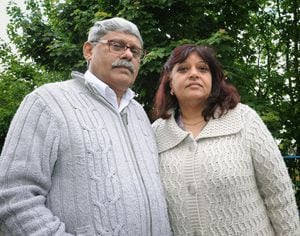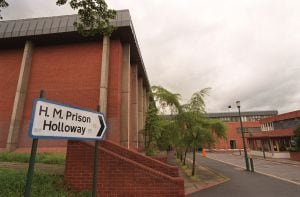Why were innocent post-office workers sent to jail?
It's the noise that haunts her.

As Tracy Felstead walks into her old cell at HMP Holloway, she stares at a stark, white room with tubular beds, the only natural light coming from tall, narrow slits in the wall which pass for windows.
"The windows are so small," she says. "The people would bang on them. It would be noisy, it would be so loud. This will be a memory, a trauma that will never go away, no matter what you do."
Miss Felstead, of Bournside Drive, Telford is one of 72 former post-office workers who were wrongly convicted because of financial discrepancies caused by a flawed computer system. Yesterday, a public inquiry opened into what has been branded Britain's biggest miscarriage of justice.
"It's made me the person I am today, but it's made me not the person I want to be," says the 39-year-old mother of three.
"I don't want to be that person who is scared of noises. I know it broke my marriage down," she says.
Miss Felstead was still in her teens when she was jailed for six months in 2001, having been convicted of stealing £11,500 from the post-office branch where she worked as a counter clerk.


Others wrongly jailed include 56-year-old Rubbina Shaheen, who kept Greenfields post office in Shrewsbury. Mrs Shaheen was handed a 12-month sentence in December 2010 after a computer reported a £43,000 shortfall in her accounts. For former Rugeley sub-postmaster Carl Page, the ordeal was even greater. Mr Page, now 55, was jailed for two years in 2007 for allegedly stealing £94,000 from the branch he kept in Anson Street.
But Miss Felstead's story seems particularly poignant because she was so young.
Like many starry-eyed teenagers, she chose to leave Shropshire at the age of 18 to make a new life with her boyfriend in London. Having landed what she thought was her dream job as a counter clerk at Camberwell post office, the young couple bought a house, and life seemed idyllic for a while.
But one day in February, 2001, on her return from a holiday with her family, Tracy was asked to produce a print off from her till.
“My till was short of £11,503.28,” she says. “Because it was my signature on the paperwork, I was liable for the loss. I was accused of stealing it.”
After being questioned by her manager, the matter appeared to blow over, and she returned to normal duties.
But a fortnight later, four men – two police officers and two Post Office investigators – made an early morning call at the home of her boyfriend’s parents.
"They knocked on the door of my in-laws at stupid o’clock in the morning,” she says. "I wasn’t there, I didn’t live there, but because I was not at my home – I was staying with friends – that was the next place they went to. They came to take me down to the police station.”
Questions were asked about how she afforded her holiday. Investigators bombarded her with questions about what she needed the money for.
“They just kept going on, ‘did you take the money for this?’ and I just said ‘I didn’t take any money’."
In June, 2001, the 19-year-old was jailed for six months. Her family had paid the money the Post Office claimed was missing in the hope that she would not have to go to jail, but the judge was having none of it.
“The judge said I had shown no remorse, and had been stealing from old age pensioners,” she says.
It was the sight of discovering an inmate who hanged herself while in prison that left the biggest mark on her.
“I had a job in there taking hot drinks to the cells, but in this one cell there was a girl, she was hanging, she was dead,” she says.
"That is something I will never get out of my mind."

She wasn't the only one to suffer great hardship. Mrs Shaheen and her husband Mohamed lost their business and their home as a result of her conviction. At one point they ended up living in the back of a van, having to use the toilets of a 24-hour Tesco to wash.
The opening day of the public inquiry heard that between 2000 and 2014, more than 700 post office workers – predominantly sub-postmasters – were prosecuted based on evidence from the Horizon computer system, installed and maintained by Fujitsu.
From 2000 up until 2019, the Post Office had mounted a fierce legal defence against claims that the evidence was flawed. In an attempt to clear up the controversy, the Post Office hired forensic accountants Second Sight in 2013. Its report found that Horizon was "not always fit for purpose", and in 2015 managing director Ron Warmington said the "vast majority of post-office workers who had been taken to court were likely to be innocent. The Post Office ended its dealings with Second Sight.
The breakthrough came in 2019, when Miss Felstead, along with more than 500 other former post-office workers, mounted a group action in the High Court. The Post Office continued to fight the claim, even launching an application for judge Sir Peter Fraser to be removed from the hearing. But in December 2019 the Post Office agreed to settle the claim, offering £57.75 million to cover damages and legal costs. The former workers could now be in line for compensation totalling £1 billion.
The inquiry, which is expected to run for the rest of this year, will look into whether the Post Office knew about faults in the IT system and will also ask how staff were made to take the blame.
Mr Jason Beer QC, counsel to the inquiry, said the ordeal of those affected could be concluded as "the worst miscarriage of justice in recent British legal history".
"Lives were ruined, families were torn apart, families were made homeless and destitute," he said.
"Reputations were destroyed, not least because the crimes which the men and women were convicted all involved acting dishonestly.
"People who were important, respected and integral part of the local communities that they served were in some cases shunned.
"A number of men and women sadly died before the state publicly recognised that they were wrongly convicted."
The inquiry is to be led by retired High Court judge Sir Wyn Williams.
He said ahead of the opening: "Much has already been written and said about how decisions made in reliance upon false information generated by the Horizon IT system caused very significant adverse consequences for many people.
"During the course of the coming weeks some of those most adversely affected by Horizon and decisions made in reliance upon it will give detailed accounts of their experiences."
He said it was important to remember that many of the witnesses would find it traumatic reliving their past experiences.
"Without such evidence, however, my ability to reach clear and considered conclusions about the nature and scale of the suffering endured by many over a substantial number of years would be seriously impaired."
The Post Office has acknowledged that mistakes were made in its handling of the case, and says it is now in the process of compensating those who were wrongly convicted.
"The overwhelming majority of the 72 people who have had convictions overturned have now received interim payments of £100,000, and we are working on final settlements," it said in a statement.





